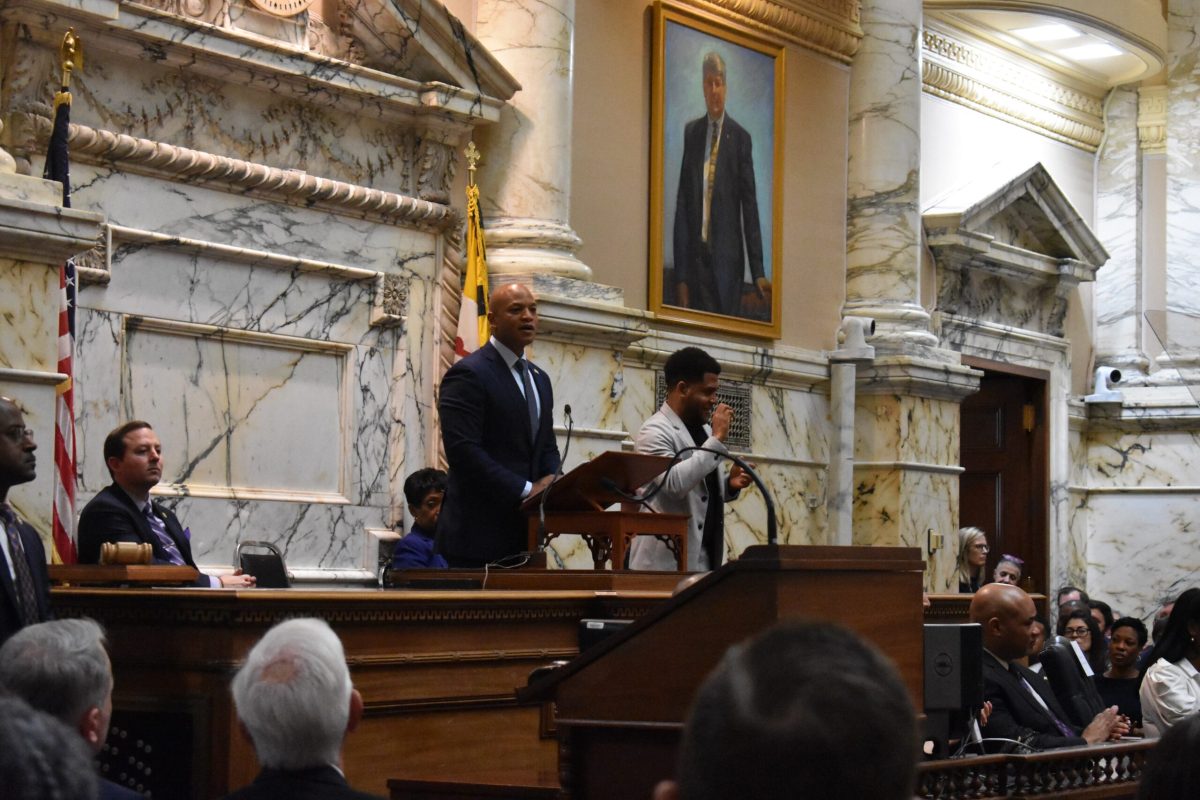By Kiersten Hacker, Capital News Service
Gov. Wes Moore delivered a State of the State address on Wednesday that candidly described some of the state’s most pressing challenges and called on lawmakers to join him in a spirit of “partnership” to tackle them all.
One year into his administration, Moore laid out several areas to work on, including public safety, affordable housing and economic competitiveness, among others.
Still, the Democratic governor described the state as “strong,” in part because his office is working collaboratively with the legislature. “I’m proud of what we’re doing. But most importantly, I’m proud of how we’re doing it. The executive and the legislature are working together again,” Moore said of the Democratic-led General Assembly. “That feels good,” he added, chuckling.
“For too long, we watched the executive pick fights with the legislature in the media, instead of showing real leadership and engagement in the State House,” he said, an apparent reference to former Republican Gov. Larry Hogan, his immediate predecessor.
Republicans pushed back against some of Moore’s assertions, with Senate Minority Leader Stephen Hershey noting that a “lofty goal” requires more work than “grand declarations.” Republicans have a duty to raise concerns about legislative actions, even while working collaboratively, Hershey said in prepared remarks shared with Capital News Service.
“This is a vision we can certainly support,” said Hershey, who represents Caroline, Cecil, Kent and Queen Anne’s counties. “After all, our ultimate goal is the success and well-being of every single Marylander.”
With his first year in office under his belt, Moore is now diving into some of the more difficult challenges of his tenure. He inherited the sweeping education reform known as the Blueprint for Maryland’s Future, and then he set his own costly goals, including construction of the Red Line and rebuilding of the American Legion Bridge. He also pledged to fill widespread vacancies in the government and eventually make Maryland the offshore wind capital of the world.
But now Moore is facing the realities of a tough financial picture with a projected deficit that could reach $1.78 billion by fiscal year 2028, mostly due to the costs of the Blueprint. With that reality looming over his plans and priorities, Moore appealed to lawmakers to work with him as partners in order to make Maryland more affordable, competitive and safe, and to make it “a state that serves.”
“Partnership doesn’t keep score. Partnership has no ego. And partnership isn’t partisan,” Moore said.
Moore announced that this week his administration will release a State Plan, outlining specific actions and realistic goals to achieve his priorities.
One of Moore’s top priorities is public safety. At a time when many communities are worried about violence, Moore pledged his administration will take an “all of government approach” to the problem.
People shouldn’t have to choose between “feeling safe in their skin and feeling safe in their communities,” Moore said. In recent days Moore has joined lawmakers to announce legislation that will crack down on youth crime and proposed a package of three other public safety bills.
Other priorities Moore raised were affordable housing and childcare, important goals in what he refers to as the country’s seventh most expensive state. His proposed fiscal year 2025 budget also includes record investments in childcare without raising taxes, he said.
Moore also called for the state to support a world-class education system, prioritizing programs like the Blueprint plan that he proposes to fully fund in the new budget. The state should create more pathways to success for young people, Moore said, and also make it easier for people to start businesses.
“This will be Maryland’s decade,” Moore said. “Not because we say so, but because we make it so – together.”
In his response to Moore’s address, Hershey argued that the governor must push for a more proactive plan in addition to the three bills. The Joint Republican Caucus has proposed two bills, the Safe Communities Act and the Violent Firearms Offenders Act, and GOP leaders say they will continue to support the Gun Theft Felony Act proposed in the past.
“Our vision for Maryland is one where public safety is not just a priority but the foundation upon which all other aspects of society rest,” Hershey said in the written remarks. “It is impossible to envision a thriving state without a strong commitment to ensuring that repeat violent offenders are held accountable and that our communities are protected from harm.”
Hershey also raised concerns about the possibility of tax increases to pay for all the Democratic priorities. Republicans support lowering the income tax rates and tax brackets, he said.
“We recognize that tax cuts are only achievable if we address the expensive mandates from the past and refrain from adding new ones that will further weigh down the budget,” Hershey said. “We must be disciplined in prioritizing the programs that are cost-effectively achieving their intended results while eliminating or scaling back the ones that are no longer necessary.”


